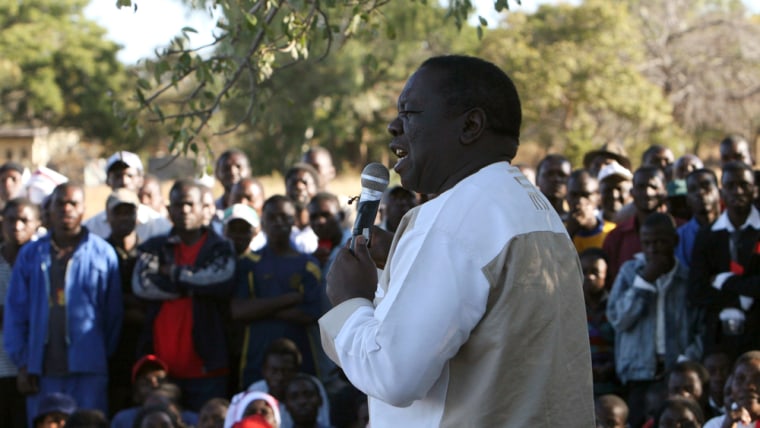A unity government could allow Zimbabwean President Robert Mugabe a graceful way to at least begin to cede power — but people fear that questions about what role he would play could derail coalition talks said to be under way.
Tuesday, opposition leader Morgan Tsvangirai said talk of a unity government, including both his party and Mugabe's, was premature. He said he was focused on campaigning for the presidential runoff, now less than three weeks away.
He did not rule out a coalition, though, saying it might be an issue after the vote.
Tsvangirai has repeatedly pledged to bring moderate members of Mugabe's ZANU-PF party — but not Mugabe — into his administration.
The sticking point has long appeared to be ZANU-PF's insistence that Mugabe be president of any unity government, along the lines of the coalition agreed to in Kenya after the results of a presidential vote last year were disputed.
Mugabe has been in power since independence from Britain in 1980. Stepping down would be a blow to the pride of a man used to adulation — even if the cheers in recent years have been engineered by party propagandists.
Brutal intimidation
Human rights groups accuse Mugabe of using violence and intimidation to ensure he wins the June 27 runoff. Mugabe trailed Tsvangirai in the March 29 first round, in which four candidates ran. According to official results, Tsvangirai did not win the 50 percent plus one vote necessary to avoid a runoff.
Tsvangirai expressed confidence that he would win the second round despite the violence, saying: "Mugabe can beat us but we will vote him out."
Tsvangirai blamed the violence on the military and police.
"The current reality is the army and police are calling the shots and Mugabe allows it to happen because it serves him," he said. "The country is now under a military junta."
The climate of fear could make many of Tsvangirai's supporters afraid to vote, and those who have fled their homes because of violence may be unable to because of laws mandating that ballots be cast in home districts.
Mugabe may claim victory, but find it difficult to claim a mandate after a vote undermined by campaign violence. That could make a coalition the only way to restore legitimacy.
Simba Makoni, a former member of Mugabe's party who finished third in the presidential election, said Tuesday that preliminary talks on sharing power are under way.
Makoni said the talks could not yet be described as formal negotiations, but that he could confirm "that I know that there are communications between and among Zimbabwean leaders at various levels."
Mugabe's Deputy Information Minister Bright Matonga said in a telephone interview Tuesday that a coalition "could be good for Zimbabwe."
Mugabe's ZANU-PF lost control of Parliament for the first time since independence from Britain in 1980 in parliamentary voting held alongside the first round of presidential voting. Most seats went to candidates representing two factions of the Movement for Democratic Change that have since pledged to work together.
"Whoever wins the presidential election will need the other parties to be able to govern," Matonga said. "We need each other. But it has to be a Zimbabwean initiative. As Zimbabweans, we are capable of running out own affairs. But we need friends like South Africa."
No comments on power-sharing talks
Matonga said he could not confirm reports the two parties were discussing sharing power. Opposition spokesman Nqobizitha Mlilo also said he could not comment on the reports that power-sharing talks were under way.
South African President Thabo Mbeki has mediated stop-and-start talks between Mugabe's and Tsvangirai's parties on behalf of the Southern African Development Community.
Mbeki has insisted on a media blackout, and his spokesman, Mukoni Ratshitanga, said the reports of renewed talks, which first appeared Tuesday in South Africa's respected Business Day newspaper, were untrue.
Mugabe was lauded early in his rule for campaigning for racial reconciliation and building the economy. But in recent years, he has been accused of holding onto power through fraud and intimidation, and trampling on political and human rights.
Zimbabwe's collapsing economy was a major concern of voters during the first round of voting. People are going hungry in what was once the region's breadbasket, with the world's highest inflation rate putting staples out of reach.
The country's economic decline has been blamed on the collapse of the key agriculture sector after the seizures — often violent and at Mugabe's orders — of farmland from whites. Mugabe claimed the seizures begun in 2002 were to benefit poor blacks, but many of the farms went to his loyalists.
His country's political and economic crises are seen as destabilizing not just Zimbabwe, but neighbors like South Africa.
